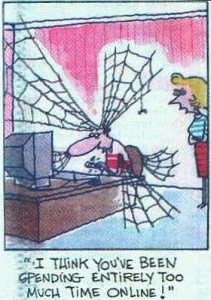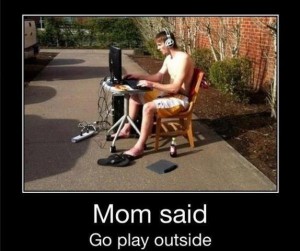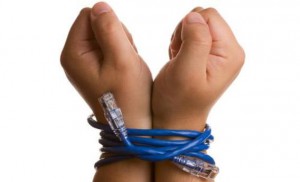As fast as the Internet’s popularity has grown over the years, Internet addictions have grown just as quickly. At one point in time, people spent hours and hours online simply because they could. But now, connections are faster than they ever were before. And the uses for Internet activity have become so widespread, that people can’t even function without going online for something. But with the explosion of Internet use has come several different types of addictions. There are even groups and clinics dedicated to “treating” people who are dealing with this sort of issue. You may even have your own computer “jones.” Determining how badly you’ve got it however, requires you to figure out which type of addiction you’re faced with. Here are five basic Internet compulsions, and how they can be damaging.
Porn
Once upon a time, there were tons of ads on television prompting people to have safe sex. With the AIDS virus (amongst other diseases) running rampant amongst the sexually active, officials felt the need to make these frequent public announcements. Enter the stage, Internet porn. Being able to queue up naked people on your computer screen for all sorts of private purposes was a dream come true for many. But the popularity of online pornography has facilitated a breakdown in countless relationships. Relying on a series of images has become a replacement for intimacy. The introduction of this issue into relationships already plagued with problems often causes nothing but more damage. Furthermore, where humans were once contracting illnesses via real sex, computers are now doubly affected by the threat of online viruses.
Social Networks/Dating Sites
Some people might argue that one rung below porn on the ladder of Internet addiction is the dependence on social networking and dating sites. Some men and women are so entrenched in their online lives that they never
fully extend themselves in the real world. Joining multiple social networking sites typically means that a person has assumed at least three or four separate identities. It is quite easy to become addicted to the person that you become in your mind—advertising online, an individual who resembles nothing of who you are inside or out. Some of these people tell themselves that they’re broadening their social circles and opening up more dating doors. But more people hiding behind their computers makes it harder to actually meet someone worth in the real world. After spending several months (or years) searching for a connection on the Internet, it is very possible to lose touch with reality.
Celebrity Gossip Websites/Blogs
Just as it is easier to send an email rather than writing a letter, it is also easier to get all the latest celebrity gossip online rather than picking up a rag at your local newsstand. Let’s face it; we can’t seem to get enough of what the rich and famous in Hollywood are up to. The Internet makes it even easier to get information about our favorite stars. Within minutes of mind-blowing incidents, their stories (and sometimes footage) have gone viral. That consumers can instantly discover what that they would normally have to wait for future publications to read, is just too enticing to pass up. And the more the demand increases, the more celebrity gossip blogs pop up. There are even blogs about blogs. This incessant need for information can completely take over. Ask yourself how much time out of your workday you’ve spent logging onto gossip sites. Where else are you going to get juicy details to discuss over lunch or at the water cooler?
Internet Gambling
People who live nowhere near casinos have discovered the wonderful world of online gambling. Being able to create accounts, login, and play against faceless competitors can be irresistible. At your fingertips, you have all sorts of ways to blow your hard earned cash. And the beauty of it is that you can do so anonymously, moving money around from place to place without ever having to touch it. And in case you actually win, the problem only magnifies. The anonymity involved with Internet gambling is what makes it so dangerous. Additionally, it’s a lot easier to conceal a gambling problem online than concealing Thursday night poker with the guys.
General Surfing
Some consumers in the world are simply addicted to their Google browsers. We all have the compulsion to get online and stay there a little (or a lot) longer than we initially intended. This
is because the ability to unleash so much information is too tempting. We need to know everything about everything. Got a headache? Do a Google search. Need tips on how to curb your child’s tantrums? Just check Google. It seems that simply knowing how to look for the solution online can solve virtually all problems in the world. And that is a downright mouth-watering concept. It doesn’t help that the Internet is designed to consume its consumers. That’s what hyperlinks are for; you’ll spend hours hopping from one link that interests you—to another, until your eyes can no longer stay open—sometimes even past that. There are some people in the world who actually hate the Internet, and can curb their use of it rather easily. Others are more inclined to occasionally hop from site to site for mere enjoyment. Ultimately, if computer use doesn’t impede your way of life or cause issues in your relationship, you’re probably a modest user. But if you’ve landed on this article because you started link-hopping yesterday morning—you might have a wee bit of a problem.









